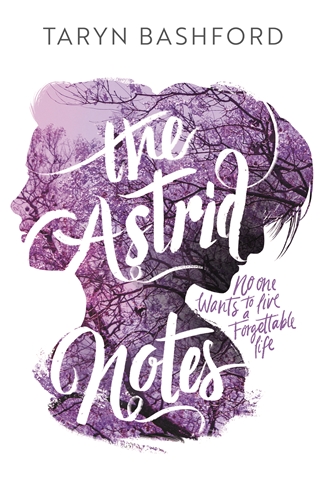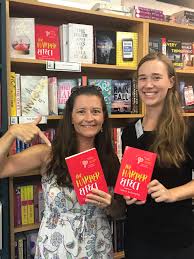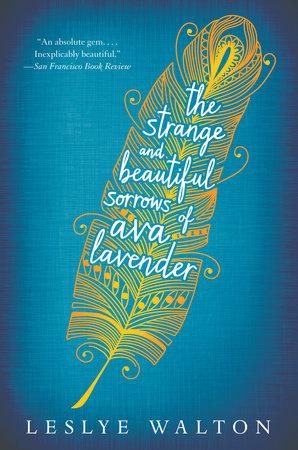
Taryn Bashford has now written and published two YA novels, The Harper Effect and The Astrid Notes (Pan Macmillan Australia). Both are gripping and memorable, dealing with situations that are rarely encountered in Australian YA.
Thank you for speaking to PaperbarkWords, Taryn.
Thank you so much for having me and for your kind words about my YA novels. I really enjoyed answering your thought-provoking questions!
We re-meet some characters from your debut novel, The Harper Effect in The Astrid Notes. This technique is not often used in YA writing and you have done a great job of changing focus, bringing characters into another life stage and introducing a new protagonist. Could you tell us how you’ve done this?

The Harper Effect
I find it very hard to let my characters go when a book finishes. It was especially hard to let Jacob go, because he still needed to work on a few things in his life—he had some growing up to do and he wasn’t a happy guy. Even though he was remorseful about his behaviour toward Harper, he still loved her, still felt alienated from his parents and the world, and so I wanted to explore his story and how he found his happy ending. I’m a bit of an optimist and I like to see my characters get their happily ever after, particularly if the topics explored during their coming-of-age were sad.
Your title The Astrid Notes is apt and clever. Could you explain the double meaning?
Thank you. I have to give credit to my wonderful publisher and editor for the title of The Astrid Notes. I like readers to interpret the title for themselves, as everyone has different backgrounds that they bring with them when they read. But for me, notes is musical notes, obviously, but also the songs Astrid wrote for Jacob to help him heal are like love notes or letters.
I found the references to different styles of music highly engaging. How did you decide to focus on these styles and genres?
I’m a classically trained musician (piano, clarinet, violin) and have a keen love for opera. However, I also appreciate all other forms of music. I guess I wanted to share that love of different styles and genres of music, and perhaps have readers consider them as different but equally valid. Many YA books explore more popular music but opera and popera is close to my heart and I hoped to expose teens to its beauty and emotional intensity.
You depict place and where characters live strongly. Could you describe an important place in the novel?
In terms of place, I always very vividly see the actual place in my mind. I rarely write down notes as the image is so detailed and clear to me. For instance, an important place in the novel is the Purple Woods as it’s symbolic of many things including childhood. It’s a combination of the woods I used to explore as a child and the jacaranda trees seen all over Mosman in Sydney, very close to where I used to live. So I can see the winding path we walked along as children, even hear our footsteps on the hardened dirt, but then the Mother Tree is in Mosman and always struck me as magical due to its size and how easy it was to climb. I also love to travel to visit places I write about—I was lucky enough to go to Vienna and take the horse and cart ride Astrid and Jacob did. I even threw coins for the street performers and went to an opera in the opera house where Astrid choked.
It may be hard to narrow down to one, but what is the strongest emotion you explore in the novel?
It’s a pretty intense novel, and yes, hard to narrow down to the strongest emotion. But as both characters suffer from grief, that’s the emotion I’ll pick. The effect of grief on each of them is different, but profound. In various ways, it’s what drives them and stops them from having the futures they deserve. But together, they’re able to work through their grief and while it will never be completely gone, in the end they’re able to grab hold of their dreams so that grief can no longer hold them back.
You have portrayed parents with depth. Why are they so integral to your story? What advice would you give one of them?
That moment when a young person realises that their parents aren’t perfect and make mistakes can be a real shock! It can shake someone’s world. I wanted to explore that notion and also the moment when a young person comes to that realisation. For Astrid, the realisation comes earlier but affects her more deeply as she has been so cloistered in her upbringing. Jacob’s realisation is nearer the end and is more triumphant in tone. My advice to Jacob is that he’ll be a better man than his father, so why does he need his father’s approval?
What have you been reading and enjoying recently?

I’m currently doing my PhD in creative writing and so I’m making my way through YA magical realism novels as I am working to bring magical realism to the problem novel. The list is long but my favourite is Leslye Walton’s The Strange and Beautiful Sorrows of Ava Lavender. I’m also writing an adult romantic suspense novel and recently read Ruby Award Runner-Up, Happy Ever After, by Joanne Tracey.
What’s next for you?
More writing! I hope to have my magical realism problem novel published, as well as my adult romantic suspense. In addition, I might not be able to resist writing Dex or Aria’s story. I feel like they still have something to say—or unfinished business to address. Perhaps your readers have a favourite character they think should have their own book?
Taryn’s website is https://www.tarynbashford.com/about-taryn

Thanks so much. I really enjoyed being a part of your awesome blog!
LikeLike
Thanks so much Taryn. You are writing really interesting work and I look forward to your magic realism novel.
LikeLiked by 1 person
Aw, thank you. *Blushes*
LikeLike